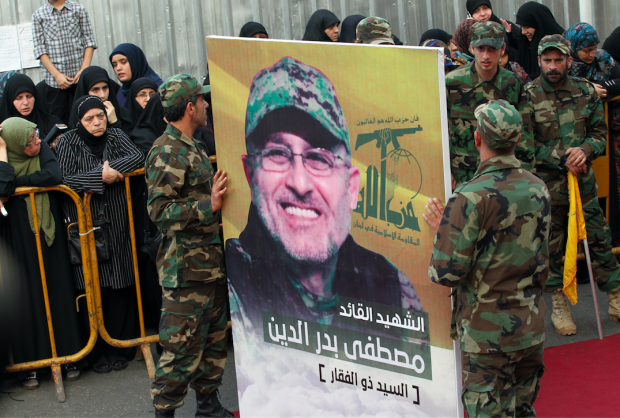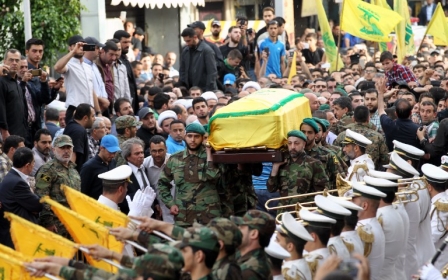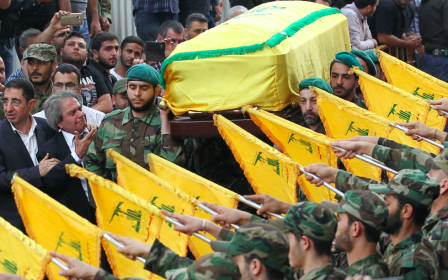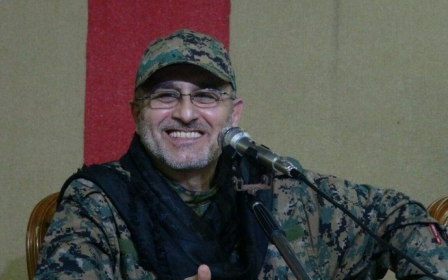Hezbollah maintains Lebanese support despite heavy Syria toll
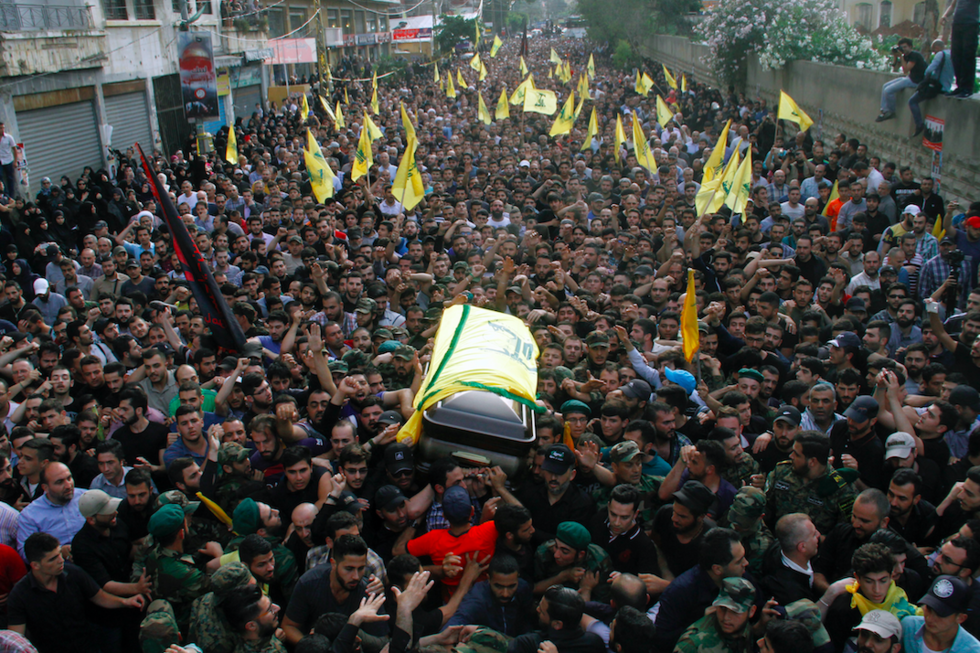
BEIRUT - Inside a half-built basement topped with three Hezbollah flags, mourners clad in black surround tombs of fighters laid to rest in four distinct lines.
The martyrs’ mausoleum in the southern suburbs of Beirut houses more than a hundred Lebanese Hezbollah fighters who fell fighting in Syria, where the group has been supporting Syrian President Bashar al-Assad since 2012. It is one of countless burial places for the movement’s fallen that lie scattered all over the country.
Most of those laid to rest here died in their early 20s, the photos on their tombstones betraying their callow faces, but a few were even younger. The youngest was just 17 when he died fighting one of the plethora of opposition groups in neighbouring Syria.
Since Hezbollah entered the fray next door, anywhere between 900 and more than 1,500 of its fighters are believed to have been killed, with many more injured.
The group’s exposure in Syria was brought home last week when Hezbollah’s top military commander, Mustafa Badreddine, was killed in contested circumstances in a secretive command facility near Damascus airport.
Despite these losses, Hezbollah leader Hassan Nasrallah said Friday that the group will boost its support for Syria's government in the wake of Badreddine's death.
"More commanders than before will go to Syria. We will be present in different ways, and we will continue the fight," he said in a televised speech.
Baddredine now lies buried in the mausoleum, where his coffin has been placed next to the tomb of his predecessor Imad Mughnieh, who was killed in Syria in 2008 also under hotly contested circumstances.
Last Friday, thousands of people took to the streets of Beirut for Badreddine’s funeral to express their grief over his killing, but Lebanon’s Shia community is no stranger to sacrifice and loss.
“We are here to remember our martyrs and to show unity,” a young man who came to honour Badreddine as well as a fallen relative told Middle East Eye.
An older mausoleum rests next to the new one, housing bodies of hundreds of fighters who died fighting the Israelis, whether during the lengthy Israeli occupation of southern Lebanon that ended in 2000 or in the sting of subsequent skirmishes and wars that have rocked the region since.
As the casualties continue to mount and with news that the group bolster support for the Assad government, questions about whether Hezbollah risks alienating its traditional support base have been growing.
A very heavy toll
The Syrian conflict is purportedly the deadliest conflict in which Hezbollah has been involved since it was set up in the 1980s to fight the Israeli invasion of Lebanon.
Despite the lack of official statistics, reports of mass casualties have been trickling out for years. Anyone visiting cemeteries in Shia-majority areas, such as Beirut’s southern suburbs or the Bekaa valley from where Hezbollah draws its support, cannot help but stumble on new graves adorned with Hezbollah flags and pictures of the dead dressed in military suits.
“The rate of fatalities they are experiencing now is greater than ever before,” Nicholas Blanford, a journalist living in Lebanon for more than two decades and who has closely followed Hezbollah’s path, told Middle East Eye.
However, while one might assume the casualties are breeding resentment, Blanford argued that the funerals have become a carefully crafted ritual that is exploited to rally Hezbollah’s support base.
“When they do have the funerals, it is an occasion to honour the martyrs, to honour the family of the martyr, to pay tribute to his role as a martyr, as a fighter for Hezbollah and for the cause,” he said.
The signs of this coordinated propaganda machine are clearly visible throughout many Shia-dominated neighbourhoods.
Entering Dahieh, the name of the large Shia suburbs of Beirut, one cannot escape the visual presence of the movement. The party has already set up a big banner with Badreddine’s face on the Hadi Nasrallah Avenue, one of the area's main roads, named after the son of the movement’s leader Hassan Nasrallah, who died in combat against Israel in 1997.
This is not the only billboard hanging from poles, buildings or glued to the walls in the large avenues and narrow streets where Hezbollah placards compete with those of the other major Shia political party, Amal, for prominence. Posters portraying religious messages, banners lamenting the situation in Palestine, and signs recalling friendships between Iranian and Lebanese leaders are all clearly visible.
Middle East Eye asked Hezbollah to comment for this article, but the group had not responded by the time it was published.
Speeches by Hezbollah's leader Nasrallah, who, in addition to announcing the increase in the group's Syria deployments, said recently that Syria is engulfed in a war because of its support for resistance movements in Palestine and Lebanon and regularly repeats vehement anti-US and anti-Israeli rhetoric, are all aimed at rallying support.
This propaganda, however, is just an extension of a wider strategy developed by the group over the past few decades – the powerful combination of which has allowed Hezbollah to morph from just another armed militia to a “state within a state,” as the party is usually called by its foes.
Hezbollah has done this by vowing to oppose Israeli aggression on the one hand while providing basic services to usually less well-off Shia neighbourhoods and working to relieve everyday hardships, like poverty.
“This [Hezbollah] state [is] comprised of a network of different institutions that [provides] a wide range of services to the Shia constituency,” said Ziad Majed, a Lebanese political researcher, in a recent paper on the role of Hezbollah within the Shia community.
“The network [includes] schools, hospitals and dispensaries; consumer, housing and construction cooperatives; sports and cultural clubs; and youth, women, and scouting groups. This network of sports and activities [is] of course in addition to the structures of the party itself, including the military, political, security, and media branches.”
Bilal Khamj, the media coordinator of Ghobeiry for Everybody, a political list that fielded candidates against Hezbollah in Shia areas in the recent municipal elections, told MEE that Hezbollah was exploiting its power to make the population dependent.
“This is a very deprived area and because they [Hezbollah] are strong and well organised, they trade services for support,” he said.
He said that Hezbollah has created a deeply entrenched system of patronage where they offer impoverished residents money for medical treatment or schooling but demand loyalty in return.
“In exchange [for their money], you have to pay with [your] support,” he said. “If you are not with the resistance [Hezbollah], they consider you to be against them.”
Recent reports claimed that dissatisfied fighters who said they were “fed up” of fighting in Syria soon found themselves and their families cut off from the social benefits that Hezbollah had been dishing out.
Khamj said that he and his group are determined to fight their hegemony and “defend our position against the control of Hezbollah and Amal”. But thus far, Ghobeiry for Everybody has failed to win out against its larger rival, as its patronage network, at least for now, continues to hold out against resentment over Syria.
There is a culture of secrecy in Hezbollah-dominated communities, and it can be difficult to get people to speak critically on the record, but analysts and residents alike seem to suggest that Hezbollah’s support has not petered out despite problems in Syria.
Ali, who spoke to MEE on condition that his real name not be used, splits his time between his family’s cafe in one of the overcrowded popular areas of the southern suburbs and a medical centre run by Hezbollah.
He said that he and his friend often talk about Hezbollah. “We can criticise Hezbollah for minor things such as how they run this area or over disagreements on what their officials say in TV,” he said. “But we agree on important issues such as countering the takfiri threat.”
Ali lives a few metres from the epicentre of one of the suicide attacks claimed by the Islamic State group that killed dozens and was carried out in retaliation for Hezbollah’s involvement in Syria. In total, there have been seven attacks in Beirut's southern suburbs since the start of the Syrian war. Dozens have been killed.
Blanford said that while some people felt “fed up with the overwhelming presence of Hezbollah,” the attacks ultimately “scared the community” into rallying around the group.
Hezbollah has also worked to rally support and minimise divisions by joining forces with Amal, the other main Shia group, and the Christian party Free Patriotic Movement. During the recent municipal elections, the two groups ran side-by-side.
With internal support in Lebanon more or less secured for now, Blanford said that Syria’s military campaign is “sustainable for now”.
“It has a psychological impact, but in terms of manpower it is sustainable,” as long as money keeps flowing in to support the array of social benefits Hezbollah gives out.
“They [Hezbollah] have been receiving less funding from Iran [which is stretched in Syria] and now they will suffer from new American sanctions,” said Blanford.
But if they can get through this, it’s likely they will be able to maintain their support, he said.
Stay informed with MEE's newsletters
Sign up to get the latest alerts, insights and analysis, starting with Turkey Unpacked
Middle East Eye delivers independent and unrivalled coverage and analysis of the Middle East, North Africa and beyond. To learn more about republishing this content and the associated fees, please fill out this form. More about MEE can be found here.


